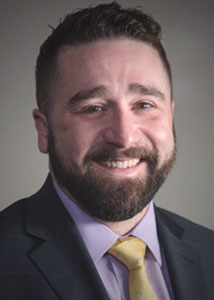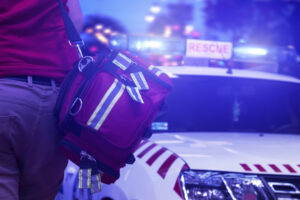 Advice from a 20-year emergency services veteran
Advice from a 20-year emergency services veteran
Brandon Daruna (MBA 2018) is the chief of the Gilpin Ambulance Authority. Over the last two decades, Brandon has gained a breadth of emergency services experience, working as a captain for Northglenn Ambulance, ski patrol assistant director at Echo Mountain, FTO with the Denver Health Paramedic Division, and volunteer fire lieutenant with the city of Golden.
Daruna teaches the Public Safety Leadership Development Program in Daniels’ Executive Education. With his deep knowledge in emergency services, he shared how some of his training could help leaders in any organization manage better during a crisis. He shared this advice in a recent Accelerate Webinar offered by Executive Education.
Whether it’s the June 21 shooting in Olde Town Arvada, the mass shooting at King Soopers in Boulder March 22, or any number of other recent examples, first responders are just that—the first to respond to emergency situations, often bringing calm and precision to horrifying events. Daruna said that while these events are no less tragic, the private or corporate sector can learn some lessons from what emergency services has been training to do for the past 20 years.

Brandon Daruna
(1) Turn Crisis into Routine
Daruna admitted that 20 years ago, emergency services may have responded to a situation that was less than ideal and not as efficient as you’d hope they’d be. But the industry made a strategic decision to attempt to make crisis situations routine.
“By making it routine and removing the emotion from our ability to respond, we significantly increase our capability in that horrible situation,” he said. “I’m not suggesting these aren’t very impactful situations for those particular responders, but, in the moment when they’re actually there executing the response, there is a routine nature to it and it’s foundational in the culture of how we do business.”
While not every emergency can be planned for, organizations that plan for a crisis and have people in place who are familiar with how it will be handled will be more prepared and therefore respond in a more routine way.
(2) Use Thoughtful Language
Daruna pointed out that the words we use during a crisis are important. People tend to say things like, “we’re in crisis mode” or “we need to put the fire out or stop the bleed.” He said using these terms only increases the emotional response to the situation.
“If we contrast that with emergency services, we call these situations incidents,” he said. “The way we talk to each other about managing these sorts of incidents is very much removing us from the emergency.”
Daruna said this isn’t to downplay the critical nature of what’s going on. “But,” he said, “We want to remind, especially new employees, that this is not their emergency. An aspect to being successful is to remove yourself from whatever the problem is.
 “We want to position ourselves in a way that we can have that distance and that distance is what allows us to make objective decisions,” he continued. “When you say things like, ‘crisis mode,’ you’re moving your organization out of its typical structure of response and problem-solving.”
“We want to position ourselves in a way that we can have that distance and that distance is what allows us to make objective decisions,” he continued. “When you say things like, ‘crisis mode,’ you’re moving your organization out of its typical structure of response and problem-solving.”
(3) Identify Experts
One way to help make situations more routine is to identify potential problems and then identify the people with expertise who can solve the problem and build robust structures of training for them.
“Give people a chance to solve the problem over and over again until it becomes routine,” Daruna said. “This way when something actually happens, they can fall back into their training instead of into an emotional space.”
Daruna said organizations can identify the potential pitfalls they might face, then identify the people with expertise to solve those problems. Then, they can make sure those are the people who will drive the problem-solving in the situation when it occurs.
Daruna also noted that organizations that handle crisis well share their mistakes so the organization can learn and grow, and they also recognize the physical, mental and emotional health of their teams.
To learn more from Daruna, visit the Executive Education website. The Public Safety Leadership Development Program occurs three times a year in the fall, winter and spring. Scholarships are available.
